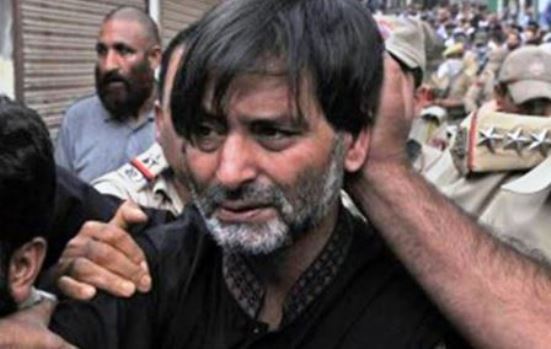LI Network
Published on: 30 May 2023 at 12:15 IST
On Monday, the High Court of Delhi issued a notice in response to a petition filed by the National Investigation Agency (NIA).
The petition requested the imposition of the death penalty for Yasin Malik, the chairperson of the Jammu and Kashmir Liberation Front (JKLF) and a leader of the Kashmiri separatist movement.
Yasin Malik had previously been sentenced to life imprisonment in a terror funding case. The Division Bench consisting of Justice Siddharth Mridul and Justice Talwant Singh directed Yasin Malik, through the Tihar Jail Superintendent, to provide a response and scheduled the matter for a hearing on August 9.
During the proceedings, Solicitor General Tushar Mehta, representing the NIA, argued that advocating the separation of a specific region from the country qualified this case as “rarest of rare,” warranting the death penalty.
The Solicitor General (SG) expressed concerns about the potential consequences of granting leniency based on pleas of guilt, stating that it would encourage individuals to avoid trial altogether. The SG argued that any terrorist could enter the country and carry out acts of terrorism, knowing that they would only receive a life sentence instead of the death penalty if they pleaded guilty.
Furthermore, the SG asserted that Yasin Malik was directly responsible for the killing of four Indian Air Force personnel in Rawalpora, Srinagar, and was also involved in the abduction of Dr. Rubaiya Sayeed, the daughter of former Union Minister Mufti Mohammed Sayeed. The SG highlighted that Yasin Malik, who had received training in Pakistan, had initially pleaded guilty and remained in jail until he was later rescued. Thus, the SG emphasized that this case fell under the jurisdiction of the NIA Act, which applied to the sentencing as well.
The law officer mentioned that following the abduction of Rubaiya Sayeed, four terrorists were released, and they subsequently orchestrated the devastating 26/11 Mumbai terror attacks.
The law officer further stated that Yasin Malik was charged under Section 121 of the Indian Penal Code, which pertains to waging war against the Government of India and carries the punishment of death.
The Supreme Court inquired with the Solicitor General regarding the specific charges against Yasin Malik and the charges to which he had pleaded guilty.
The Bench requested the National Investigation Agency (NIA) to indicate where the acts of killing and kidnapping were mentioned in the trial court’s order that framed charges against Yasin Malik. The Supreme Court also inquired about the specific part in the order that referred to charges related to causing the death of public officials and abduction for coercing the government. The Bench observed that the trial court order did not mention the allegations made in the charge sheet against Malik and allowed the NIA to submit relevant documents indicating the charges against him.
The Solicitor General argued that the trial court order specifically referenced Section 15 of the Unlawful Activities (Prevention) Act (UAPA) and that there were multiple references to secessionist and terrorist acts, which could warrant the death penalty.
The High Court noted that since Yasin Malik had pleaded guilty to a charge under Section 121 of the Indian Penal Code (IPC), which carried the possibility of the death penalty, it issued a notice to him regarding the application seeking condonation of the appeal’s re-filing delay. The Bench also issued production warrants for Malik.
The Solicitor General alleged that Yasin Malik had pleaded guilty in a calculated manner. However, the Supreme Court acknowledged that it could be his constitutional right. The Solicitor General responded by saying that even Osama Bin Laden, if tried in the Court, would have been allowed to plead guilty.
The Supreme Court noted orally that comparing the two cases was not appropriate, as Osama Bin Laden had not faced any trial in his lifetime. The Solicitor General then remarked that the United States was possibly right. The Supreme Court stated that it could not comment on matters that might impact the country’s foreign relations.
The NIA was represented by Special Public Prosecutor Akshai Malik, as well as Advocates Akshay Sehgal and Khawar Saleem.
In May of the previous year, a special NIA court sentenced Yasin Malik to life imprisonment in a terror funding case, to which he had pleaded guilty.
According to the NIA, if notorious terrorists like Malik were not given the death penalty despite pleading guilty, it would undermine the sentencing policy and provide terrorists with a way to avoid capital punishment. The NIA argued that a life sentence did not align with the severity of the crimes committed by terrorists, considering the nation’s loss and the impact on the soldiers’ families.
Regarding the trial court’s conclusion that Malik’s crimes did not fall under the “rarest of the rare cases” deserving the death penalty, the NIA considered this observation legally flawed and unsustainable on its face.
The NIA reiterated that there was clear proof beyond a reasonable doubt that Malik led terrorist activities in the Valley, orchestrating armed rebellion with the help of foreign terrorist organizations to undermine India’s sovereignty and integrity.
The agency asserted that not imposing the death penalty on such dangerous terrorists would result in a miscarriage of justice, as terrorism was not only a crime against society but against the entire nation. They argued that it constituted external aggression, an act of war, and a violation of the nation’s sovereignty.
The NIA had previously sought the death penalty for Malik in the trial court. However, the NIA Special Court opined that the death penalty should only be awarded in exceptional cases where the nature of the crime “shocked” the collective consciousness of society.
Malik was convicted under various sections of the IPC and UAPA, including conspiracy, waging war against the government, and unlawful activities.

